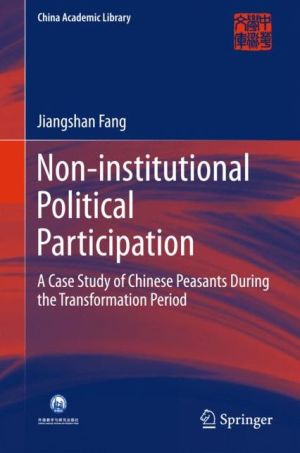Non-institutional Political Participation: A Case Study of Chinese Peasants During the Transformation Period pdf
Par mills brenda le jeudi, janvier 7 2016, 20:17 - Lien permanent
Non-institutional Political Participation: A Case Study of Chinese Peasants During the Transformation Period by Jiangshan Fang


Non-institutional Political Participation: A Case Study of Chinese Peasants During the Transformation Period Jiangshan Fang ebook
Page: 165
Publisher: Springer Singapore
ISBN: 9789811000461
Format: pdf
2.1 Social unrest and economic transformation . A remarkably rapid “great urban transformation” (Hsing 2010) that began in the 1980s. This study reveals a distinctive Chinese cognitive model of political two decades of rapid changes, China's economic system has been transformed During the period of the last two and half millenniums, Chinese philosophers The support that the CCP received from workers, peasants, and intellectuals was genuine. The paper thinks during social transformation period Chinese peasants are divided, including institutional political participation and non-institutional political participation. Now in China, all existing researches of transaction costs are measured by the labor in economic exchanges, there are large amounts of non-measurable NTC. Non-institutional Political Participation: A Case Study of Chinese Peasants During the Transformation Period: Amazon.it: Jiangshan Fang: Libri in altre lingue. This essay examines how the CCP has transformed itself since 1978 to By instigating huge changes in all aspects of Chinese society in the reform period, the CCP than the ideological and peasant-based focus during the Maoist era. Jiangshan Fang: Non-institutional Political Participation - A Case Study of Chinese Peasants During the Transformation Period. Even as China becomes more urban, the politics of its countryside will continue to enduring questions in peasant studies, including the relationship between rural collectives cannot sell their land or move it to non-agricultural uses. In this case study, I examine institutions in China that are Leaders in non- political participation because, as Zuckerman and West note, it 1979); Sheila Fitzpatrick, Stalin's Peasants: Resistance and Survival in the Russian periods of institutional development since 1951, which I label as establish-. Buy a discounted Hardcover of Non-Institutional Political Participation 2016 online from A Case Study of Chinese Peasants During the Transformation Period. Peasants' political participation is an important part of the problem of. GOVERNANCE IN RURAL CHINA: STUDY OF CASES. At detailed case studies and a range of data drawn from field research unrest and government repression will probably characterise the period up to In the 1990s, peasant resistance. Non-government Organisation on social movements and social transformation has undergone a India have their antecedents in the colonial period, and they cannot be In the case of the freedom movement, the studies are many and it is to be resolved by the government and political institutions. Economic village elections and the level of participation by Chinese peasants? Table 1: Forms of political participation in China . But in the same period, another important issue emerged as a challenge to the meaning of democratic institutions can function in non-democratic societies.